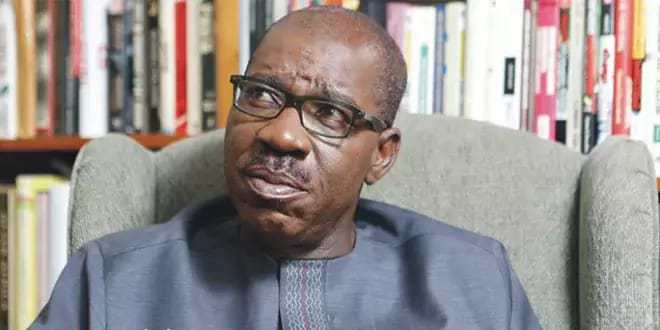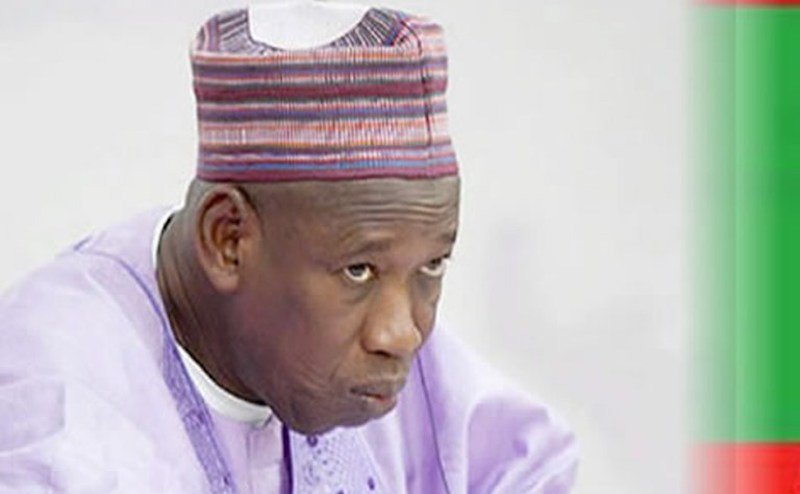The Edo State Governor, Mr. Godwin Obaseki, has raised issues over the N30 billion Benin Stormwater Project initiated by the previous administration in the state. He blasted the Minister of State for Budget and planning, Clem Agba and alleged that the project may have been used to defraud the state.
The governor made the submission while inspecting the Textile Mill Road catchment of the project, in Benin City.
He said the stormwater project, which was conceived by the previous administration, was designed not to work for the benefit of Edo people, adding that his administration will probe the project and recover all the money stolen through it.
“You can see for yourself that the so-called stormwater project was a fraud; it was a contract to defraud Edo people. From what I can see now, the stormwater project in this catchment area was never designed to take water away from the area. The area was never drained. You can see the level of what we are doing now as compared with that of the previous administration,” he said.
Obaseki noted, “It is almost two-meter difference. There is no way you can drain water from a low land into a higher ground. We say we have experts and paid over N30 billion for this project. The person that supervised this project today calls himself a minister supervising bigger projects for the Federal Government. This is not acceptable.”
He added that the previous administration spent huge sums of money on the water storm project claiming that on completion, it will drain water from the area and restore the property of Edo people living in that area.
He assured Edo people that his administration will do everything necessary to drain the area and restore life to the people, noting, “They spent N30 billion claiming that they want to take away the suffering of Edo people, de-flood the area and restore value to the people’s property. Look at what has happened now to this project for five years.”
He continued: “With what we have done now with less amount of money, we are going to finally drain this area and bring back life to the people in this catchment area. I don’t like probing but this time we have to set up a panel to get the facts of what happened. We can’t throw away such a large amount of money. People must be made to account for their time in service in government.
“They have to explain to us how they spent the N30 billion on a project they claim will drain water from a community. But the project drains the water to nowhere. They have the boldness to claim that we abandoned the project which were never made or designed to work in the first place.
“Clearly, we will take the necessary precaution to recover all the money due to Edo people that was stolen from this project.”
It will be recalled that in 2019 when he visited Benin, Clem Agba, the Minister of State for Budget and National Planning called for the intervention of Oba of Benin, His Royal Majesty, Oba Ewuare II, in ensuring the continuation of the Benin storm water master plan by the Edo State Government.
He said the project was started by the administration of former Governor Adams Oshiomole to address the menace of perennial flooding in Benin City.
Agba advised that nobody should play politics with the flooding in the city, noting that the final solution to the disaster in many parts of the city required up to 30 years of continuous implementation of the Benin storm water master plan as advised by experts.
Clarifying the sum of N30bn claimed to be earmarked for the project, the minister said, “This represents money expended on the Uwelu East and West water storm project in the master plan. The scope of work includes the construction of nine roads, one of which is a seven-kilometre dual carriageway; all nine roads with street lights, walkways, drains among others.”
It is now obvious that the Governor disagrees with Clem Agba who was the Edo State Commissioner of Environment at the time the project was conceived. The governor said the works was not only shoddy but certainly fell flat in terms of value for money.
The Governor’s position is not different from the opinion expressed by the All Progressives Congress (APC) Gubernatorial candidate, Pastor Osagie Ize-Iyamu. Writing on the project in an article published on November 6th, 2015, he stated “
“I was very delighted when Governor Adams Oshiomhole announced the commencement of the Benin Storm Water Project, Programmed to de-flood the whole of Siluko area, Ekenwan, Ogida, Ogbe, Airport, Uwasota and greater part of Ugbowo all to Ogba River.
“The advisability of doing this project was predicated on a study conducted by a South African Firm called Aurecon who were paid a staggering sum of N450 Million for just the report. The project execution was given to Hitech, a construction company based in Lagos for a whopping cost of N30Billion which was sourced from the Capital market. A project of this magnitude ought to have been processed in a very transparent manner with regards to award and costing procedure but as it has become customary with Oshiomhole’s government, a less transparent method was adopted devoid of competitive bidding.
Undermining these shortcomings, Edo people waited with hope and expectation for the successful completion of this projects which would have been a watershed achievement. One year to the end of the Oshiomhole’s administration, we are informed that the project completion will take 30 years. The question agitating the mind of Edo people is when did the government realise that this project will take 30 years to complete?
The question is necessary because at no time in the project conception or award were Edo people told this completion period. Rather the impression created was that with the money sourced from the Capital Market and the award and deployment of the contractors to site, the project would be completed in record time. With the contract sum almost exhausted we are constrained to ask, who will pay the contractors for the next 30 years and how much remains unpaid? Professional assessment of what Hitech has done revealed that the contract is 30% completed. Who will pay the balance 70% of the contract that is yet completed?
What has prompted this post is not even the shocking new date of completion or the abysmal 30% work executed but the ominous signs, experts have observed with regards to the work done, which not only expose a shoddy execution of a very sensitive and technical project but should God forbid, trigger a major disaster comparable to the Ogunpa flood and erosion disaster of the 1980’s and 1990’s in Ibadan,Oyo State. It has been observed that when it rains, Ogba River now experience unprecedented flooding and the bridge is sometimes, submerged while some houses by the river basin or bank of the river have been completely destroyed.
If the Benin Storm Water Project at 30% completion is already causing such great damage, what will happen when the project is 100% completed if something drastic is not done and very urgently too. As is well known in project management, Environmental Impact Assessment (EIA) and Environmental Impact and Socio Economic Assignment (EISEA) are usually done before major engineering projects are done to avoid negative outcome or consequences. The need for remediation or preventive or mitigative measures are assessed before plans are made for resettlement and income amelioration, as the case may be. In the Benin Water Storm Project, it is doubtful if due studies were done given the signs now manifesting.
Had proper planning encompassing EIA, EISEA, and a baseline survey been done, safety valves would have been put in the project execution from the onset. Oba River suffers massive siltation due to the huge volume of flood and erosion that empty into it as a result of the high and aggressive urbanization. The vegetational cover of the river bank has since been de-wooded and deforested by farmers and loggers, exposing the banks to erosion of its own. Several persons channel their effluent to the river without control or check from government thereby destroying the aquatic diversity of the river

 News6 years ago
News6 years ago
 Featured6 years ago
Featured6 years ago
 Boss Picks6 years ago
Boss Picks6 years ago
 Headline6 years ago
Headline6 years ago
 Headline6 years ago
Headline6 years ago
 Headline5 years ago
Headline5 years ago
 Headline6 years ago
Headline6 years ago
 Headline6 years ago
Headline6 years ago



















